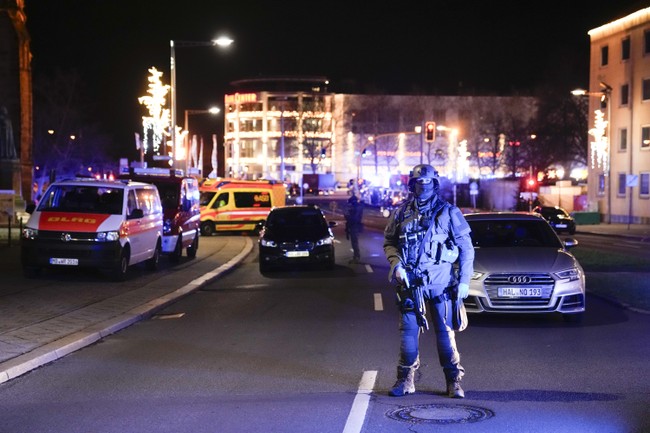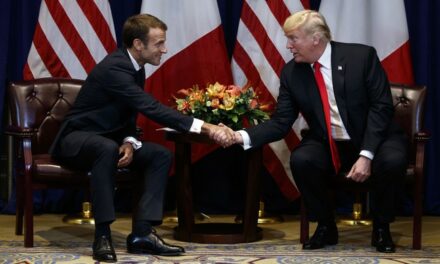We support our Publishers and Content Creators. You can view this story on their website by CLICKING HERE.

When news broke late yesterday of a terror attack on a Christmas market in Magdeburg, Germany, no doubt many assumed that this would be another Islamist perpetrator. Earlier attacks by Islamists had focused on Christmas markets, and other attacks had also used cars to kill bystanders and pedestrians. Given the sharp rise in anti-Semitic incidents over the past 14 months in Europe and the US, it seemed natural to assume this attack would fit the same pattern.
Advertisement
Except that it didn’t. Police arrested the 50-year-old perp on the scene where at least five people were murdered and over 200 injured, and he indeed turned out to be a well-known activist-turned-terrorist — but maybe not in the way one might expect, as the Wall Street Journal reported this morning:
Yet the suspect’s profile that began to emerge hours after the drama painted a surprising portrait—that of a Saudi exile and vocal anti-Islam activist—leaving a perplexed Germany unsure about what lessons should be drawn from the drama.
The attack had come just a day after a Christian service in Berlin commemorating the victims of an Islamist attack on Dec. 19, 2016, when a Tunisian man who had pledged allegiance to Islamic State had driven a truck through a Christmas market in the capital, leaving 13 dead.
Earlier this year, four people were killed in two Islamist attacks, which have become more frequent in the last decade in Germany. Security services specifically warned of a very high threat from Islamic assaults on Christmas markets in the run-up to the festive season. …
Taleb Al Abdulmohsen, the suspect, had fled Saudi Arabia because he rejected Islam, a crime in the Middle-Eastern Kingdom, which enforces a strict version of Islamic law, a security official said.
“Perplexed” is putting it mildly. Abdulmohsen isn’t so much a political refugee as he is an apostate on the run. Saudi media wasted no time in painting him as a “traitor” once news of his identity became public, and as Beege noted yesterday, had also painted him as a rapist and terrorist back home as well. Abdulmohsen, moreover, was no shrinking violent or quiet opponent of Islamism. He spent years developing a media presence to warn Europeans against allowing Islamists to migrate through refugee programs or other means, as several news outlets noted overnight:
Advertisement
On the social media platform X, Al Abdulmohsen described himself as “Saudi military opposition” and made wild allegations against Germany in his biography, saying it “chases female Saudi asylum seekers inside and outside Germany, to destroy their lives,” and “wants to islamize [sic] Europe”. …
Abdulmohsen has previously given interviews to German and international media as well as right-wing websites. In 2017, seven years before he carried out his deadly attack, The New Arab published correspondence with him, while in 2019 the BBC interviewed him. He presented himself at the time as a human rights activist.
German local newspaper Frankfurter Rundschau reported five years ago that he had come to Germany for specialist training as a psychotherapist but then applied for asylum, after he was reportedly threatened with death for abandoning Islam.
Five days before carrying out the attack he railed against Syrian refugees in Germany in an interview with the right-wing RAIR Foundation.
“Germany is welcoming Syrians—including many Islamists—while simultaneously rejecting Saudi apostates, people who are genuinely fleeing Sharia-based death sentences,” he said.
This doesn’t appear to just be schtick, in other words. Abdulmohsen has spent several years agitating publicly against Islamists and the Saudis, even well after his refugee status was confirmed. He came to Germany in 2006 and waited a decade to get reclassified as a refugee, and only after that became a public activist against the “Islamicization of Germany.”
Advertisement
We’ll get to the counter-argument shortly, but for now let’s just assume that the perp has been legitimately anti-Islam. His point has been the dangers of allowing potential terrorists and tyrants into the heart of the West. What happened to push Abdulmohsen to adopt terrorism as a tactic? He might have been leaning that way for more than just the last few days. AFP reports that the suspect posted a suggestion four months ago that he might adopt this tactic:
“He is a psychologically disturbed person with an exaggerated sense of self-importance,” Taha Al-Hajji, legal director of the Berlin-based European Saudi Organisation for Human Rights, told AFP. …
Last August, he posted on social media: “Is there a path to justice in Germany without blowing up a German embassy or randomly slaughtering German citizens? I have been seeking a peaceful path since January 2019 and have not found it. If anyone knows it, please let me know.”
In the post, he condemned what he called “the crimes committed by Germany against Saudi refugees and the obstruction of justice, no matter how much evidence was presented to them”.
That seems to suggest that Abdulmohsen radicalized himself out of frustration over what he saw as a lack of progress on his political goals. That’s the black-letter legal description of terrorism, as Luigi Mangione is finding out in New York this week as well. The two cases also seem to share the same kind of bizarre narcissistic flavor, too — activists who decide that they need to violently impose their will after apparent impotence to effect change in more rational and legal ways. If so, it’s a little stranger in this case, since Germany appears headed into an election that probably favors the right-leaning populists that might have been more receptive to Abdulmohsen’s views on immigration restrictions.
Advertisement
Could Abdulmohsen have flipped more recently to Islamist intent? It’s possible, but why keep up the opposite argument publicly even to the last few days? Some point to the target of the attack — Christians and Christmas — as evidence of Islamist intent, but that could just be either a target of opportunity or an attempt to punish mainstream Germans for ignoring his warnings. What’s the point of doing that for almost a decade as “cover” for an attack he could have launched at any time if he wanted to do so for Islamist purposes? Abdulmohsen has also repeatedly published his support for Israel after the October 7 massacres, which would be very strange even for a crypto-Islamist living a cover for the purpose of setting up a one-off, lone-wolf attack.
Police will have to unwind this during their investigation, and in the meantime, we should allow for all possibilities. Given the nature of Abdulmohsen’s increasingly strident public activism, it seems likely that he and Mangione will turn out to be equally voluble about attempting to justify their actions.
In the end, though, terrorism is terrorism and must be dealt with in a firm-unto-Draconian manner pour ne encourager pas les autres, no matter the issue or motivation. If Abdulmohsen (and Mangione) failed to heed Nietzsche’s famous warning about the dangers of fighting monsters and gazing too long into the abyss, don’t expect sympathy from the rest of us. It does serve as a reminder that terrorism takes many forms and serves many evil ends, and it’s not always easy to guess which form of evil we experience in the first shock of terrorism.
Advertisement

 Conservative
Conservative  Search
Search Trending
Trending Current News
Current News 







